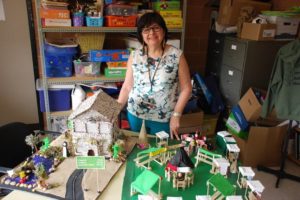Strength in numbers and a name: strong registration numbers for new Indigenous specialization program

By Laura E. Young
SUDBURY—Specialization is the key word as Cambrian College welcomes a revitalized Indigenous social service worker diploma to its program offerings this September.
And for Lorie Pelletier-Bell, of Dokis First Nation, the program coordinator of the social service worker – Indigenous specialization (SSIS), the title reflects strength.
“It shows a pride in who we are. It also shows that it’s a specialization to know your culture, your healing methodologies, your history. It’s a specific knowledge,” she says.
Currently, 25 students have registered for the program. Upon graduation and registration, they will be professionals with the Ontario College of Social Workers and Social Service Workers. Cambrian is one of two Ontario colleges to offer this specialization.
The program, once named the Native branch of the social service worker diploma, returns after an eight-year absence and that too is significant for Pelletier-Bell. No longer is the word ‘Native’ used as an add-on or a sidebar to the overall social service worker picture.
“It’s a recognition of what you have to offer because it takes years and years to relearn your culture, and sacrifice and go to ceremonies and listen to people’s stories.”
The child welfare jurisdiction is returning to the Indigenous communities, says Janice Clarke, dean of the Schools of Justice, Community Services and General Studies.
“We saw a renewed need for a specialization because students need to have more background if they’re going to be working in Indigenous communities,” says Clarke.
Pelletier-Bell also believes that the program was restored because of awareness of the truth and reconciliation commission.
“Cambrian College has made a commitment to create stackable courses that are part of the core programming,” she adds, as part of that awareness.
“Cambrian is working partnership with First Nations and filling a need.”
Upon successful completion of the program, SSIS graduates will have the “enhanced knowledge, skills, and the cultural competencies to work effectively with Indigenous peoples”, according to Cambrian’s program overview. They may also continue studies at college and university, receiving some credit for already having the SSIS diploma.
Students will find a representation of themselves in the course. The students will need to understand their history, their communities and specific social service worker skills, Pelletier-Bell says.
“They also need to understand, [that] we have traditional health methodologies that go back a long, long way, before there were social service workers or social programs.”
The methodologies developed through the course of ceremony, a way of living and a worldview. Many of those teachings are brought forward to today, which people are still practising, like inclusiveness, a sense of community, value systems like non-interference, she adds.
Overall, Pelletier-Bell says the Indigenous community has provided good feedback to the college as the diploma was developed.
“Our job here is to make sure we represent well and we’ll hear back from the community when our students go out [on placement].”
So far, application rates are strong, says Janice Clarke.
“It would appear it’s not all Indigenous students who are applying for it. More and more in community services and justice programs we’re seeing more Indigenous content being delivered.”
Pelletier-Bell sees the students helping with overall understanding.
“We all have to live in this country together. We have to come together.”


